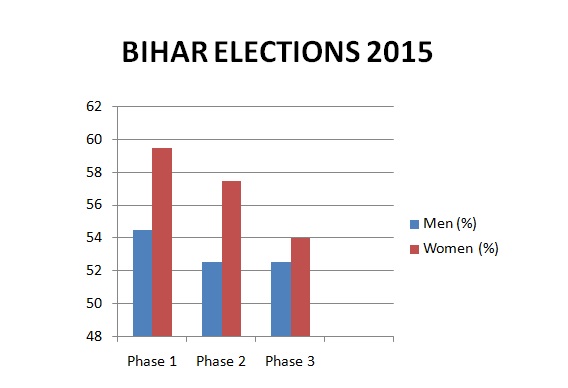
New Delhi: Bihar Assembly elections are proving to be a ‘litmus test' for the political future of both Chief Minister Nitish Kumar as well as Prime Minister Narendra Modi. Both these leaders have carefully nurtured their respectively constituencies in which they are hugely popular.
But there is one constituency that has shown immense enthusiasm in exercising their franchise and the political pundits are keeping their fingers crossed over how this upsurge of ‘the fairer sex' will impact the outcome of the most crucial Assembly elections of year 2015.
In first three phases of Assembly elections, Bihari women have outnumbered their male counterparts in coming out of their homes and casting their votes.
Read Also: PM Modi sensing defeat in Bihar, claims Rahul Gandhi
In first phase, 59.5% women exercised their franchise compared to 54.5% men, a clear margin of a 5% in their favour. In second phase, 57.5% women cast their votes compared to 52.5% men. Once again, the margin was 5%. In the third phase, 54% women pressed the button of EVMs compared to 52.5% men. Here again, they outnumbered men of Bihar.

What is the meaning of huge turnout of women in these Assembly elections? Which alliance is going to benefit the most?
It is difficult to predict if there is a clear preference among women either for the grand-alliance or NDA. But there are certain factors that indicate that the higher turnout can benefit both the sides for different reasons.
Bihar Chief Minister Nitish Kumar has been trying to cultivate this constituency right from 2005 when he took the oath of office. His ‘Mukhyamantri Balika Cycle Yojana', under which around 4 million bicycles have been given to school going girls, has changed the face of female education in Bihar. Many of these girls are now eligible voters and supposed to be reaching out to booths with great enthusiasm that is expected from a first-time voter.
Secondly, the decision of Nitish Kumar government to reserve 50 % of seats in Panchayat and local bodies for women have also gone a long way in empowering females of the state. Those who were deprived of having any say in decision making bodies are now actually heading these bodies. The sense of empowerment has further strengthened their belief in the democratic system and that could also be a reason of higher turnout of women in these elections.
‘Hunar' programme, specifically launched for Muslim girls by Nitish govt, is a huge success story that has also been appreciated by NITI Aayog. Under this scheme, free skills training is being imparted to poor and out-of-school Muslim girl children to ensure their socio-economic and education empowerment. This has also resulted in young Muslim girls getting a new sense of empowerment and they are also believed to be participating in this festival of democracy with much fervour.
Having said all this, it can't be overlooked that Prime Minister Narendra Modi, spearheading NDA campaign in Bihar, has also cultivated ‘female' constituency from the day one of his stint in 7, Race Course Road. He was hugely popular among women of Gujarat when he was CM of that state and as recorded in a survey, it was mainly on account of his image as a non-nonsense administrator.
PM Modi's ‘Beti bachao, beti padhao' scheme coupled with his relentless efforts to provide toilet in each and every household has won him many admirers among women across the country including Bihar. Both these schemes have been highly appreciated by the womenfolk in rural areas and Bihar is predominantly rural demographically.
What can also tilt women votes in favour of NDA is Nitish Kumar's alliance with Lalu Prasad-led RJD. The BJP and its allies have left no stone unturned in reminding the electorate especially the females that a victory for Nitish would mean the return of Lalu Prasad's jungle raj where no women would be safe. Even die-hard RJD supporters concede the point that the 15 years of RJD rule is not rated highly on the parameter of law and order and this factor can go in favour of Modi-led NDA.
Irrespective of which alliance benefits the most, the higher participation of women in these Assembly elections is a good omen for the future of democracy in Bihar which witnessed a highly feudal and patriarchal society in the past.



















